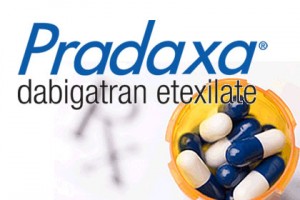
FDA allowed the new anticoagulant Pradaxa to go on the market without any known way to quickly reverse its effects.
Cardiac patients who experience atrial fibrillation are routinely prescribed anti-clotting drugs to help prevent strokes. For many years, the most popular anti-clotting agent has been warfarin, marketed as Coumadin. Warfarin is the active ingredient in rodenticides like D-Con, which work by causing rats and mice to bleed to death internally. Coumadin works by depleting the body’s level of active Vitamin K, a clotting factor present naturally in many foods. But Coumadin has major drawbacks. Patients taking it require frequent monitoring to assure they have the correct levels of the anticoagulant in their blood, and have to be careful about what they eat, because foods high in Vitamin K can alter Coumadin’s effectiveness. Recently new anti-clotting drugs have come on the market that have been hailed as major improvements over Coumadin because diet not a factor and patients taking them require little or no monitoring for blood levels. With brand names like Pradaxa (dabigatran), Xarelto (rivaroxaban) and Eliquis (apixaban), the new drugs are being hailed by investors in Big Pharma as “blockbuster” drugs, and their manufacturers are, as usual, aggressively marketing them through television ads. But these drugs can be quite costly in several ways. Pradaxa and Xarelto cost around $3,000 a year, while warfarin costs as little as $200. But a much bigger problem for patients is that there is no known antidote to the new drugs for patients who experience bleeding emergencies. If a patient taking blood thinners accidentally gets cut or injured, their bleeding can be life-threatening. For patients on Coumadin who experience bleeding or hemorrhaging, doctors can simply administer Vitamin K to reverse the effects of that drug and stop the bleeding. But no known antidotes yet exist for the new wave of anticoagulants. The U.S. Food and Drug Administration (FDA) has allowed these new drugs to go on the market without requiring their manufacturers to create antidotes to them. And this is no small problem. The new blood-thinning drugs have already been linked to hundreds of deaths. FDA data shows Pradaxa was linked to over 500 deaths in 2011 alone, and the agency is now warning people about the dangerous and irreversible side effects of Pradaxa. Emergency room doctors report that they have had to watch helplessly as patients taking these drugs bleed to death, and personal injury lawyers bringing class action cases over these drugs are warning the public about the dangers posed by new anticoagulants like Pradaxa in their blogs. Some studies suggest the risks of these new drugs may outweigh their benefits.

Thanks for this very important message, Anne.